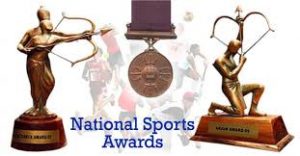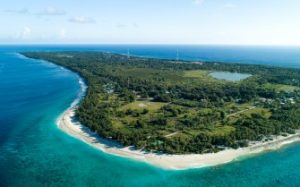Daily Current Affairs for Government Exams:
Today Current Affairs: 22nd August 2020 for UPSC IAS exams, State PSC exams, SSC CGL, State SSC, RRB, Railways, Banking Exam & IBPS, etc
Table of Contents
Contents:
- National Sports Awards 2020.:
- Mulgaonkar principles’:
- India has committed to the Maldives a five-pronged package
- Union Peace Accord III:
- Other important current affairs:
1. National Sports Awards 2020.:

Government of India announced the National Sports Awards 2020. Cricketer Rohit Sharma, Para-Athlete Mariyappan Thangavelu, Table Tennis player Manika Batra, Wrestler Vinesh Phogat and Indian Women’s Hockey team captain Rani Rampal will receive the Rajiv Gandhi Khel Ratna Award.
- National Sports Awards are given every year to recognize and reward excellence in sports. It comprises the following awards –
- Rajiv Gandhi Khel Ratna: It is the highest sporting honour of India. It was instituted in 1991–92. The recipient(s) is/are honoured for their outstanding performance in the field of sports over a period of four years at international level.
- Dronacharya Awards: It was instituted in 1985 to honour eminent Coaches for producing medal winners at prestigious International sports events.
- Arjuna awards: It was instituted in 1961. To be eligible for the Award, a sportsperson should have had not only good performance over the previous four years at the International level but also should have shown qualities of leadership, sportsmanship and a sense of discipline.
- Dhyan Chand Award: It was instituted in 2002. It is an award for life-time achievements in sports.
- Tenzing Norgay National Adventure Award: It is the highest national recognition for outstanding achievements in the field of adventure on land, sea and air.
- Maulana Abul Kalam Azad (MAKA) Trophy: It was instituted in 1956-57 to honour the top overall performing university in the Inter-University Tournaments.
- Rashtriya Khel Protsahana Purushkar: It was instituted from 2009 to recognize the corporate entities (both in private and public sector) and individuals who have played a visible role in the area of sports promotion and development.
2.Mulgaonkar principles’:

In the criticism against the Supreme Court’s ruling that held advocate Prashant Bhushan guilty of contempt of court, his counsel has invoked the ‘Mulgaonkar principles’, urging the court to show restraint.
- S Mulgaonkar v Unknown (1978) is a case that led to a landmark ruling on the subject of contempt.
- By a 2:1 majority, the court held Mulgaonkar, then editor of The Indian Express, not guilty of contempt although the same Bench had initiated the proceedings.
- Justices P Kailasam and Krishna Iyer formed the majority going against then Chief Justice of India M H Beg. Justice Iyer’s counsel of caution in exercising the contempt jurisdiction came to be called the Mulgaonkar principles.
- Underlining his reasons for not exercising the court’s power to punish for contempt, Justice Iyer said the first rule in the branch of power is a “wise economy of use by the Court of this branch of its jurisdiction”.
- He argued in favour of harmonising “the constitutional values of free criticism, the fourth estate included, and the need for a fearless curial process and its presiding functionary, the judge”.
3.India has committed to the Maldives a five-pronged package:

India has committed to the Maldives a five-pronged package including air, sea, intra-island and telecommunications to help it deal with the economic impact of the Covid-19 pandemic.:
- The package includes:
Greater Malé Connectivity Project (GMCP)
- A financial package consisting of a grant of 100 million USD and new line of credit of 400 million USD.
- This will be the largest civilian infrastructure project in Maldives, connecting Malé (the capital) with three neighbouring islands — Villingili, Gulhifalhu (where a port is being built under Indian line of credit) and Thilafushi (new industrial zone) – by construction of a bridge-and-causeway link.
- This will boost economic activity, generate employment and promote holistic urban development in the Malé region.
Direct Cargo Ferry Service:
- It will be run between India and Maldives.
- The service is expected to enhance sea connectivity and provide predictability in supplies for importers in Maldives and exporters in India.
Air Travel Bubble Between India and Maldives:
- This will facilitate movement of people for employment, tourism and medical emergencies.
- Maldives is the first neighbouring country of India with which an air bubble is being operationalised.
- Quotas for Supply of Essential Commodities: This was renewed for 2020-21.
- The commodities include food items as well as river sand and stone aggregates to assure food security, and supply of essential construction items.
Financial Aid:
- In addition a financial aid of 250 million USD will be provided to Maldives by India.
Impact on India-Maldives-China - The Indian aid is being appreciated and contrasted with the previous expensive commercial loans to Maldives by China which are being termed “debt-trap diplomacy” of China, wherein China intentionally extends excessive credit to another country with the intention of extracting economic or political concessions from the debtor country.
- The GMCP is also being compared to the Chinese built Sinemale Friendship bridge connecting Male to two other islands as it will be much bigger than the latter.
- The India-Maldives relationship suffered a setback when Maldives entered into a Free-Trade Agreement (FTA) with China in 2017.
- However with the election of a new pro-India government in Maldives, the relationships have improved and Maldives is also considering pulling out of the FTA with China.
- .At present, India-assisted projects in the region include water and sewerage projects on 34 islands, reclamation projects for the Addl island, a port on Gulhifalhu, airport redevelopment at Hanimaadhoo, and a hospital and a cricket stadium in Hulhumale.
- India had also announced a 800 million USD Line of Credit to Maldives in December 2018.
4.Union Peace Accord III:

The government of Myanmar and ten armed ethnic groups signed a framework agreement for the implementation of the National Ceasefire Agreement (NCA) at Nay Pyi Taw at the end of the 4th session of the Union Peace Conference – 21st Century Panglong.
- The accord opens a door to solving misunderstanding regarding the NCA and difficulties faced in its implementation.
- The peace accord called Union Peace Accord III contains 15 provisions to implement the NCA.
- These include troop deployment, protocol to deal with skirmishes between government troops and the armed groups among others.
- The agreement contains a step by step peace process for implementation beyond 2020 in working for peace, democratic reform, federalism and national reconciliation.
- Currently, the 4th round of the peace process is being held between the government and armed ethnic groups that signed the NCA.
- The peace process in Myanmar was started In 2011 by President Thein Sein to end the long standing conflict with ethnic armed groups active in the country.
- A National Ceasefire Accord (NCA) was signed in October 2015 with armed ethnic groups. Subsequently the dialogue to initiate a political peace process was started in 2016 which is continuing.
Other important current affairs:
1.The Turkish President reconverted the Chora museum into a mosque.
- This is the second museum after Hagia Sophia to be converted into a mosque. Turkey has also found a new gas field in Black Sea.
- Chora Museum:
- It was built initially as a church in 534 AD, during the early Byzantine period.
- In the 11th century, its internal walls, pillars and domes were covered with mosaics and frescoes showing scenes from biblical stories.
- After the conquest of Constantinople (capital city of the Roman Empire) by the Ottomans (1453), the church was seized and turned into a mosque in 1511.
- In 1945, it was converted into a museum.
- Chora is also known as Kariye in Turkish and the mediaeval Church of the Holy Saviour in Chora.
- The reconversion can be seen as Turkish President’s pro islamic policies, where he emphasises Turkey’s Ottoman history and domestic achievements over Western ideas and influences.
- By adopting pro Islamic policies the Turkish President aims to become leader of the Muslim world
2.It has been reported that Nepal has proposed a meeting of the Boundary Working Group (BWG) in August end or early September 2020.
- The meeting was proposed during a telephonic conversation between the Prime Ministers of the Countries on 15th August 2020 (India’s 74th Independence Day).
- This high level contact came after nearly nine months of tension and war of words after India (in November 2019) asserted control over the Kalapani-Lipulekh-Limpiyadhura region of Pithoragarh (Uttrakhand) which is claimed by Nepal.
- Boundary Working Group (BWG):
- The BWG is a joint agency constituted by the governments of India and Nepal in 2014 to carry out works in the fields of construction, restoration and repair of boundary pillars including clearance of ‘no-man’s land’ and other technical tasks.
- Led by the Surveyor General of India, the BWG is different from the foreign secretaries meeting that is being sought to discuss the Kalapani border dispute, but it is an important mechanism to review the boundary work.
3.The Centre has appointed Rajiv Kumar as the Election Commissioner. He has been appointed in place of Ashok Lavasa, who has resigned to join the Asian Development Bank (ADB).
- The Election Commission of India is an autonomous constitutional authority responsible for administering Union and State election processes in India.
- The body administers elections to the Lok Sabha, Rajya Sabha, State Legislative Assemblies in India, and the offices of the President and Vice President in the country (Article 324).
- It is not concerned with the elections to panchayats and municipalities in the states. For this, the Constitution of India provides for a separate State Election Commission.
- The Election Commission shall consist of the chief election commissioner and such number of other election commissioners, if any, as the President may from time to time fix.
- Presently, it consists of the Chief Election Commissioner and two Election Commissioners.
4.According to SEBI data, the value of participatory note (P-note) investments in Indian capital markets increased to Rs. 63,288 crore till July 2020-end.
- This is the fourth consecutive monthly rise in investments through P-notes.
- Of the total Rs. 63,288 crore invested through the route till July, Rs 52,356 crore was invested in equities, Rs.10,429 crore in debt, Rs. 250 crore in hybrid securities and Rs. 190 crore in the derivatives segment.
- Derivative is a financial instrument which derives its value from the underlying assets.
- Monthly Rise:
- The investments through P-notes was Rs 62,138 crore at the end of June 2020.
Prior to that, investment level was at Rs 60,027 crore and Rs 57,100 crore at the end of May and April, respectively. - The investment level had fallen to over a 15-year-low of Rs 48,006 crore at the end of March 2020.
- The figure at the end of March 2020 was the lowest level of investment since October 2004, when the total value of P-note investments in the Indian markets stood at Rs 44,586 crore.
- The lower figure in March came amid significant volatility in broader markets on concerns over the coronavirus-triggered crisis.
- The investments through P-notes was Rs 62,138 crore at the end of June 2020.
5.Scientists from Agharkar Research Institute (ARI), Pune have found the first synthetic route for producing flavonoids molecules related to the treatment of tuberculosis and chikungunya.
- ARI is an autonomous institute of the Department of Science and Technology (DST), Government of India.
- It is for the first time that scientists have been able to synthesize the flavonoid molecules such as rugosa flavonoids, podocare flavone and isoflavone in a lab.
- These three molecules have so far been isolated from plants only and are found to inhibit tuberculosis and chikungunya.
- Flavonoids are part of the polyphenol class of phytonutrients (plant chemicals) found in almost all fruits and vegetables. Along with carotenoids (organic pigments), they are responsible for the vivid colours in fruits and vegetables.
6.The scientists from Indian Institute of Science, Bangalore have fabricated a skin conformal tattoo sensor about 20 micrometre thick.
- The scientists were working on wearable sensors that can retract information from the human body using its skin (largest organ of the human body).
- Features: The tatto sensor promises continuous monitoring of vital health parameters of an individual, like pulse rate, respiration rate, and UV rays exposure, skin hydration level, glucose monitoring, and so on.
- It is non-invasive and does not interfere with the daily activities of the user.
- The sensor has a fast response and follows easy fabrication steps and can be patterned into any shape and size using a laser.
- Benefit: The sensor serves as a single conduit for sensing respiration rate and pulse, dispensing with the need of mounting multiple sensors.
- It has the potential to replace rigid and bulky health monitoring devices.
7.For the first time five sports persons will be receiving the Rajiv Gandhi Khel Ratna on the occasion of the National Sports Day on 29th August.27 sports persons have also been finalised for the Arjuna Award while five coaches will receive the Dronacharya Award.
- Ms. Rani will become only the third Indian hockey player after Dhanraj Pillay and Sardar Singh to receive the Khel Ratna.
- Shri Mariyappan T. is the only third Indian para-athlete to be awarded the Khel Ratna award, after former Paralympic medallists Devendra Jhajharia and Deepa Malik.
- Rajiv Gandhi Khel Ratna Award is the highest sporting award given by the Ministry of Youth Affairs and Sports for the spectacular and most outstanding performance in the field of sports by a sportsperson over a period of four years.
- The award comprises a medallion, a certificate, and a cash prize of Rs 7.5 lakh.
- The National Sports Day is observed every year across India on 29th August to mark the birth anniversary of the legendary hockey player Dhyan Chand who was born on 29th August 1905.
8.The first-ever State Dragonfly Festival, also known as Thumbimahotsavam 2020 will be organized in Kerala jointly by the World Wide Fund for Nature (WWF)-India State unit and Society for Odonate Studies (SOS).
- SOS is a non-political, non-profit organization formed to impart knowledge to the public on the insect order of Odonata (which comprises dragonflies and damselflies) and to conduct scientific studies, with the objective of conservation of the species and their habitats.
9.The National Highways Authority of India (NHAI) has developed a mobile App, ‘Harit Path’ to facilitate creation of Green Highways across the country.
- The App will help to monitor location, growth, species details, maintenance activities, targets and achievements for each and every plant.
- Monitoring: In order to track the growth and health of the plants, photographs along with data of the plants captured using Harit Path App shall be uploaded every 3 months on NHAI’s Artificial Intelligence powered Big
- Data Analytics platform – Data Lake.
- Accountability: Highway contractors shall be accountable for proper upkeep and maintenance of the plantation and liable to replace the missing/dead plants.
- Payment: Performance and growth of the plants shall be linked to the payment to the contractors for this work.
- Harit Bharat Sankalp: Recently, NHAI has completed 25 years of its service, to commemorate this it has undertaken ‘Harit Bharat Sankalp’ a nation-wide plantation drive.




